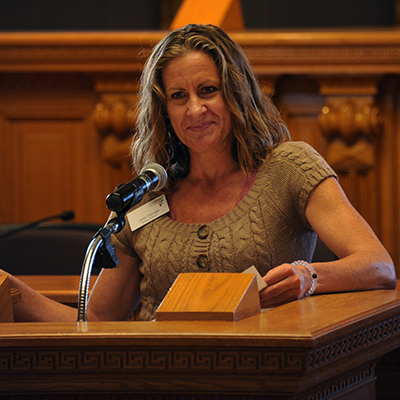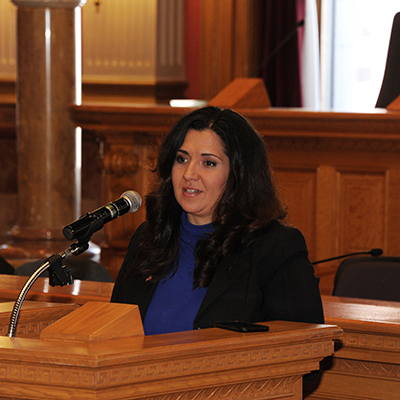Policy Digest for June 2017
 The 2017 legislative session officially came to a close on May 10th capping a session Governor Hickenlooper called “one of the most productive” in the history of state. While it is a true that a number of major legislative accomplishments made their way to the governor’s desk, including moving the Hospital Provider Fee to an enterprise fund (freeing up $560 million in the state’s budget cap) and a compromise on construction defects litigation statutes. But for advocates of healthy eating and active living, the 2017 session was, at best, a mixed bag. Most significantly for LiveWell Colorado, two measures, including a measure which would have leveraged billions of dollars in bond capacity for transportation infrastructure- including hefty investments for walking, biking, and transit –died in the Senate despite bipartisan support in the House. LiveWell-sponsored HB 1192, designed to support local producers, low-income Coloradans, and farm to school efforts, also failed in the Senate despite bipartisan support in both chambers.
The 2017 legislative session officially came to a close on May 10th capping a session Governor Hickenlooper called “one of the most productive” in the history of state. While it is a true that a number of major legislative accomplishments made their way to the governor’s desk, including moving the Hospital Provider Fee to an enterprise fund (freeing up $560 million in the state’s budget cap) and a compromise on construction defects litigation statutes. But for advocates of healthy eating and active living, the 2017 session was, at best, a mixed bag. Most significantly for LiveWell Colorado, two measures, including a measure which would have leveraged billions of dollars in bond capacity for transportation infrastructure- including hefty investments for walking, biking, and transit –died in the Senate despite bipartisan support in the House. LiveWell-sponsored HB 1192, designed to support local producers, low-income Coloradans, and farm to school efforts, also failed in the Senate despite bipartisan support in both chambers.
Before we turn to 2018, read more below about the specific proposals and the politics that played out to end their runs. Over the summer, LiveWell will turn its attention to the federal policy.
State Policy
HB1192 – COFSAC
HB1192 died in Senate State Affairs one week prior to the end of the session. The bill died on a 3-2 party line vote with the three Republican committee members, Jerry Sonnenberg (R-Sterling), Ray Scott (R-Grand Junction) and Jim Smallwood (R-Parker), voting against it. The bill would have combined the Farm to School Task Force and the Colorado Food System Advisory Council, and required the resulting council to support Farm to School efforts, coordinate among various state and federal agencies to more easily connect farmers to consumers on food assistance programs, and engage in an ongoing, comprehensive analysis of Colorado’s food systems. To accomplish this mission, the bill provided for one staff person at the Colorado Department of Agriculture. Despite data which demonstrates that staffing food council positions increases market share and profit for local farmers, grows local and regional economies, and increases healthy food access for school kids and persons on food assistance programs, the Senate committee members decided that the cost of one staff person was too much to ask given current budget restrictions. Because we are convinced that this small investment by the state would widely benefit Colorado’s economy, we look forward to again promoting this issue in the 2018 legislative session.
Transportation Funding Measure Implodes
 Last we wrote, House Bill 17-1242, the bill to refer a transportation funding measure to voters in November, was on life support. Unfortunately, the Senate Finance Committee pulled the plug and our hopes for a well vetted, bi-partisan and well-rounded transportation funding measure bit the dust. With the finish line in site, having passed in the House as well as through the Senate Transportation Committee, neither the bill’s Senate sponsors, President Kevin Grantham (R, Canon City) and Senator Randy Baumgardner (R, Hot Sulphur Springs), nor any of the multitude of proponents supporting the measure were able to get a third vote out of the Senate Finance Committee and the bill died on a party line 3-2 vote with Senators Owen Hill (R, Colorado Springs), Tim Neville (R, Littleton) and Jack Tate (R, Centennial) voting to kill the measure. Kudos to Speaker of the House Crisanta Duran (D, Denver) and Senate President Kevin Grantham for countless hours of negotiations and for coming to a compromise that had widespread support.
Last we wrote, House Bill 17-1242, the bill to refer a transportation funding measure to voters in November, was on life support. Unfortunately, the Senate Finance Committee pulled the plug and our hopes for a well vetted, bi-partisan and well-rounded transportation funding measure bit the dust. With the finish line in site, having passed in the House as well as through the Senate Transportation Committee, neither the bill’s Senate sponsors, President Kevin Grantham (R, Canon City) and Senator Randy Baumgardner (R, Hot Sulphur Springs), nor any of the multitude of proponents supporting the measure were able to get a third vote out of the Senate Finance Committee and the bill died on a party line 3-2 vote with Senators Owen Hill (R, Colorado Springs), Tim Neville (R, Littleton) and Jack Tate (R, Centennial) voting to kill the measure. Kudos to Speaker of the House Crisanta Duran (D, Denver) and Senate President Kevin Grantham for countless hours of negotiations and for coming to a compromise that had widespread support.
So now what? That’s the million dollar question. If you have been following local coverage of the legislature, you likely have heard about the passage of Senate Bill 17-267, the bill that reclassifies the hospital provider fee as an enterprise fund and removes these dollars as revenue for purposes of the state’s TABOR limit. This is an important accomplishment. Without the re-classification of the hospital provider fee, the state faced cutting $528 million to hospitals throughout the state. This would result in reduced services at major Denver-area hospitals and the possible closure of six to 12 smaller rural hospitals. On the transportation side, within SB 267, there is a provision that allows the state to issue certificates of participation on state-owned property to fund a $1.8 billion program for transportation funding. A quarter of this money is dedicated to rural roads and 10 percent to transit. Although $1.8 billion sounds like a lot of money, it is a drop in the bucket. The improvement needs of I-25 north and south and I-70 alone would consume these dollars, without even touching the projects that have been identified across the state by local governments. From our perspective, SB 267 does little to nothing to address active transportation infrastructure needs.
As such, LiveWell Colorado will continue working with the coalition of transportation funding proponents that amassed over the past several months to find a sustainable and meaningful transportation funding solution that includes dedicated dollars to walk, bike and transit.
Federal Policy
Federal Budget
Congress passed a budget that will keep the federal government funded through September 2017. Due to the time constraints, the budget contained very little of the cuts President Trump indicated he wanted to see through the release of his “skinny budget” in March. However, the next round of budget negotiations may not be so benign. Currently, as Congress ramps up negotiations for the 2018 budget, they appear to be looking for ways to trim the budget, mostly through social programs such as SNAP (food stamps) and welfare. They are looking for ways to decrease the deficit, while also increasing military spending and cutting corporate taxes. Additionally, budget writers are trying to find ways to pay for President Trump’s $1 trillion infrastructure plan. Accomplishing all of this, without increasing the deficit, would probably require reform of the Medicare and Social Security entitlement programs – items President Trump has said he will not touch. However, he also pledged to not cut Medicaid, but the House version of the American Health Care Act, which President Trump has said he supports, would cut Medicaid by $880 billion. All that to say, we will be watching the budget situation as it develops. We will be working with our state and national partners to weigh in on issues that negatively impact our food systems.

